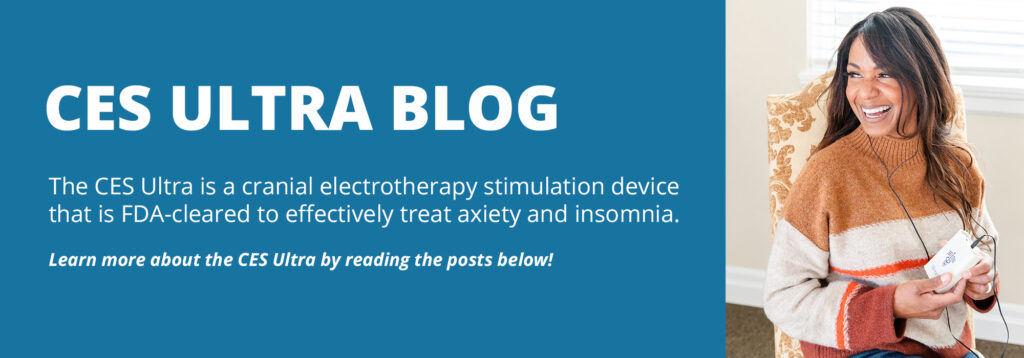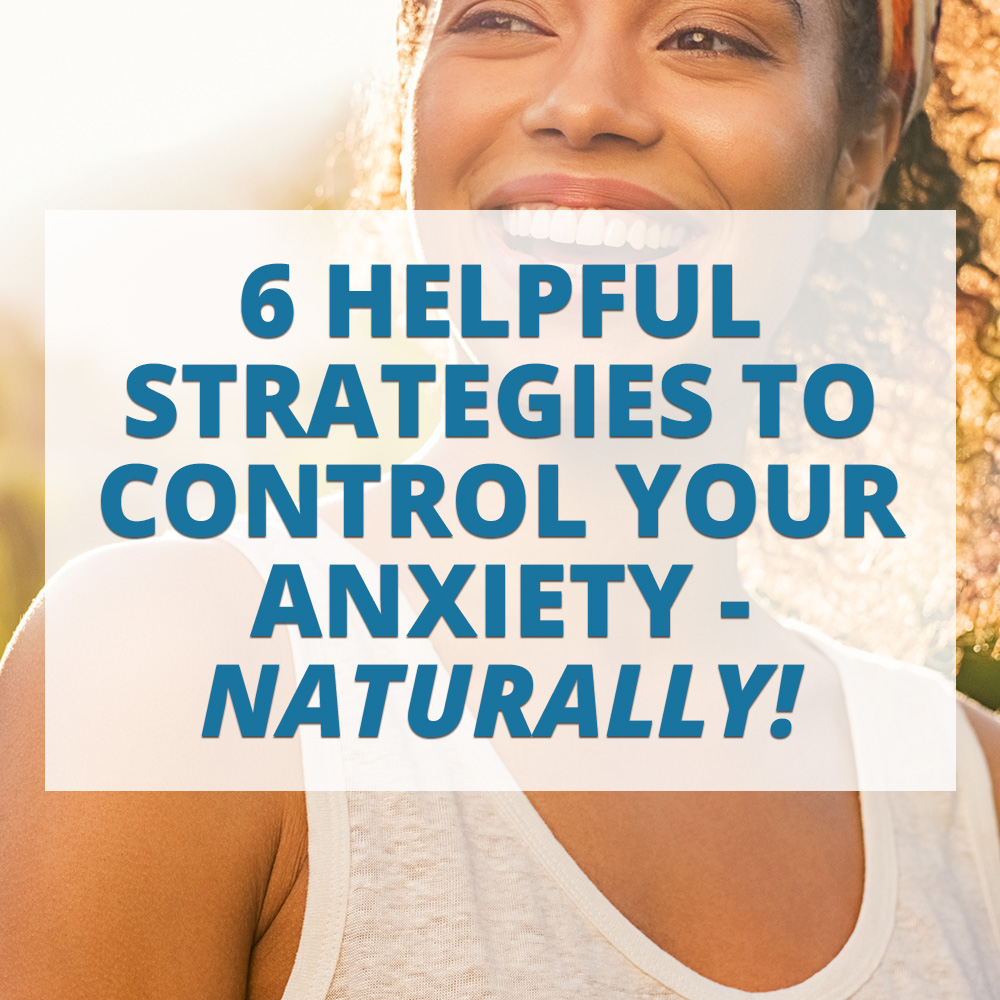Wondering how to control your anxiety? You’re not alone! In fact, anxiety is the most common mental struggle among Americans, with 40 million+ adults suffering each year (and plenty of kids and teens, too!) Unfortunately, only about 40% of anxiety sufferers actually receive treatment—and treatment options are relatively limited in the mainstream medical system.
What Treatments Are Available for Anxiety?
If you go to your doctor looking for help with controlling your anxiety, he or she will likely direct you to do one of 2 things:
- Try medication
- Use lifestyle interventions, including therapy
Unfortunately, medications for anxiety (benzodiazepines) are dangerous, controlled substances, and don’t even begin to address the underlying cause of anxiety. Due to their risks, they are only supposed to be used for a short period of time (2 weeks to 1 month). Even within that timeframe, they can cause dependency, as their sedative effect is extremely addictive.
Some doctors instead prescribe antidepressants longterm, attempting to increase the efficiency of calming hormones like serotonin in the brain. These medications also create dependency without solving the underlying problem, and also carry risks of dangerous side-effects.
So, aside from lifestyle changes to reduce stress (which are important) what are we to do? Therapy is expensive and drugs aren’t ideal. Many people feel trapped and never seek help for their anxiety. There has to be a better answer, right?
Yes! There are ways to naturally control or even overcome anxiety, without spending thousands of dollars on therapy, or becoming reliant upon medication. We’ll explore 6 helpful strategies in this article. But first, let’s talk a little more about what anxiety is, and the science behind how to overcome it.
What is Anxiety?
Anxiety ranges from mild to severe and manifests in different ways, including:
- Generalized anxiety disorder
- Panic disorder
- Phobias
- Social anxiety disorder
- Post-traumatic stress disorder
- Obsessive-compulsive disorder
- Separation anxiety.
All forms of anxiety are complex, difficult to bear, and sometimes debilitating. Over time, anxiety can have a detrimental impact on health, happiness and quality of life.
Anxiety:Rooted in the Nervous System
The nervous system is essentially the command center of the body. It handles communication between the brain and the body. Anxiety always occurs as a result of stress on the nervous system. The source of stress can come from the past, present, or future.
Early in the days of humanity, our nervous systems evolved to protect us from the dangers of early life on planet earth. Early humans had to contend with a number of serious threats in order to stay alive. The autonomic nervous system developed two branches: the sympathetic state, and the parasympathetic state.
The parasympathetic state is optimal for growth, development, repair, and day-to-day life. It is the state that allows our bodies to “rest and digest” and recover from the wear and tear of life.
Stuck in “Fight or Flight?”
On the other hand, the sympathetic state is essentially S.O.S. mode. You may have heard it called “fight or flight” mode. Its purpose is to save peoples’ lives when they are in legitimate danger—think running from a tiger! This state releases a cascade of hormones causing a faster heart rate, higher blood pressure, quicker reflexes, and increased blood flow to the appendages to help us run away from or fight off threats. Do those symptoms sound familiar? Ideally, we’d spend most of our lives in the parasympathetic state and only experience the sympathetic state for short spans of times, recovering quickly.
However, this modern world has our nervous systems confused. We’re not running from tigers, but our fast-paced lives, endless to-do lists, and the highly stimulating environment we inhabit is tricking our bodies into thinking we’re in constant danger. Cortisol (the stress hormone) runs high, kicking us into fight-or-flight mode and preventing the periods of resting, healing and digesting that our bodies really need.
When we spend too much time in the sympathetic state due to perceived (or real) stresses of life, anxiety is often the result. And the problem is, once we’re trapped in the cycle, it’s really hard to break free. Stress causes anxiety, which causes trouble sleeping, which causes more stress and fear. We never catch a break, and our nervous systems keep working in overdrive to try to keep us alive. Over time, it takes a real toll.
Calming the Nervous System is Key
If you want to control your anxiety, calming the nervous system is key! (https://cesrelief.com/ #ces) You need to bring yourself out of that fight-or-flight state and back to a place of calm— but when you’re trapped in the cycle, that’s much easier said than done! Your brain has gotten comfortable in this wired survival mode. It’s gotten used to producing high levels of cortisol and it’s learned to survive on less serotonin, melatonin and endorphins. You’re stuck in an unhealthy pattern, and you need some help to pull out of that.
That’s why “lifestyle interventions” like meditation, mindfulness, relaxation techniques and just trying to be less stressed don’t always work (although those are excellent things to try!) We’re going to share with you 6 strategies that really make a difference in pulling out of fight–or-flight mode and resetting some of the neurochemical imbalances that keep you feeling anxious. Check them out below!
6 Helpful Strategies to Control Your Anxiety – Naturally!
1) EXERCISE: ESPECIALLY HIIT
Getting your heart rate up in the naturally correct way will help reset your nervous system and release calming neurotransmitters after you finish. If you can, do your workouts in the morning! HIIT workouts are more beneficial for anxiety than simple cardio routines, because of the chemical effects they produce in the brain. However, HIIT can be a little bit of a science at first. As such, you may want to use a guided program in the beginning. You can find HIIT workouts in many paid programs, and free guided workouts on YouTube!
2) GET EDUCATED ABOUT YOUR SYMPTOMS
We recommend reading the book DARE: The New Way to End Anxiety and Stop Panic Attacks by Barry McDonagh. It’s a fantastic book that teaches you that once you are no longer afraid of your anxiety, it can no longer control you, and you will be free. For many anxiety sufferers, simply understanding what anxiety is and how to not fear it is the boost they need to start feeling better. Find the book on Amazon or at another online book retailer!
3) SUPPLEMENTATION
Did you know that supplementation can be a powerful way to reset chemical imbalances in the brain. Supplements are a much more natural approach than medication, as they’ll work with your body and help retrain your brain to produce healthy levels of neurotransmitters on its own. If you are deficient in certain vitamins and minerals, that can cause anxiety symptoms as well. Luckily, feeling better may be as simple as adding a few herbs, vitamins, or nootropics to your daily routine.
Ask your practitioner about 5-HTP, GABA, Magnesium, Inositol, L-Theanine, and nervine herbs, and find out the right combination for your needs. Imbalances in your brain and body can exacerbate anxiety. Proper supplementation can make a HUGE difference when your brain chemistry is balanced and functioning properly!
4) KEEP BLOOD SUGAR REGULATED
Did you know that blood pressure spikes and dips can actually cause or exacerbate anxiety? Keep your blood sugar stable by eating more whole foods at regular intervals, and less processed foods (especially sugars). Don’t drink coffee or have caffeine on an empty stomach.
Focus on fruits and veggies (organic, if you can!), and good sources of protein and fat, rather than breads, pastas and sugar (which make anxiety worse!). Try not to eat carbs and sugars on their own. Instead, pair them with a good dose of fiber, protein or fat (or all three!) You can learn more about blood sugar management by following this account on instagram: https:// www.instagram.com/glucosegoddess/
5) GET ACUPUNCTURE
You may not have thought of this before, but if there’s a reputable acupuncturist in your area, consider signing up for a treatment series! Acupuncture brings the body out of fight-or-flight mode and back to a state of calm. If funds are tight, you can use acupressure (stimulation of acupuncture points without needles) at home on the following points: Heart 7, Pericardium 6, Lung 9, and Spleen 6. Use your pointer finger to press firmly on each point for 30 seconds. Repeat up to three times daily.
p.s… Acupuncture is NOT painful, dangerous, or scary! Licensed acupuncturists are exceptionally gentle and well-trained, often with the equivalent of a Doctorate degree in Chinese Medicine. You have nothing to lose—give it a try!
Strategy #6 is the most powerful, the most promising, and the MOST important!
6) CRANIAL ELECTROTHERAPY STIMULATION WITH CES ULTRA
Cranial Electrotherapy Stimulation (CES) (https://cesrelief.com/#ces) is a safe, painless microcurrent therapy scientifically proven to treat anxiety and insomnia in children, teenagers and adults alike.
The CES Ultra (https://cesrelief.com) uses gentle microcurrent, often via gelled electrode pads on the neck or ear clips, to stimulate tissue in the hypothalamic area of the brain with a specific, healing frequency. The result? Significant improvement in anxiety and insomnia.
How Does CES Work?
When electrical activity in the nervous system is balanced and consistent, the brain and body can function at their highest level. However, stress can disrupt normal electrical patterns in the brain, resulting in neurochemical imbalances that can cause anxiety, frenetic thought, compulsive behavior, and disrupted sleep-wake cycles.
Cranial Electrotherapy Stimulation directly addresses the nervous system imbalance (https:// cesrelief.com/#studies) and restores order to the chaos. It decreases heart rate and blood pressure, increase levels of serotonin, melatonin and b-Endorphins, and DECREASE cortisol, bringing the brain back to a place of peace, clarity and calm.
Simply place the ear clips on your ear lobes (https://cesrelief.com/#training) or the electrode pads behind your ears, turn the handheld device on, and set the stimulation to a comfortable level for you. Leave the device on for 30-45 minutes (you can even set a timer for automatic shut off!) Treat 1-2 times per day in the beginning, then slowly decrease treatment frequency as you start to feel your anxiety is under control.

How Does CES Compare to Medication?
The CES Ultra has been tested in dozens of clinical trials and studies, including a meta- analysis by the Harvard University School of Public Health, which found that CES has a statistically significant effect on alleviating anxiety.
In such trials, over 70% of users saw a significant improvement in their anxiety after 2 weeks of consistent use. In fact, CES Ultra performed BETTER than medication.
Try the CES Ultra to Control Your Anxiety for 60 Days

The CES Ultra is available by prescription from a licensed healthcare provider. Miridia Technology is a USA-based distributor of the CES Ultra with licensed practitioners on staff who can write a prescription for the device after your purchase. They’ll review your case and make sure it’s a good fit for you.
The best part is, you can try CES Ultra for yourself for 60 days. See if it works to naturally control your anxiety. If not, you can send it back within that 60 day window for a full refund.
Are you ready to start feeling better, control your anxiety naturally, and stop feeling trapped by your stress? The time is now! You can learn more about the CES Ultra and try it for yourself here: https://cesrelief.com/#anxiety
***This article is written for informational purposes only, and does not constitute medical advice. Always work with a qualified healthcare provider when making decisions about your health and wellness.

